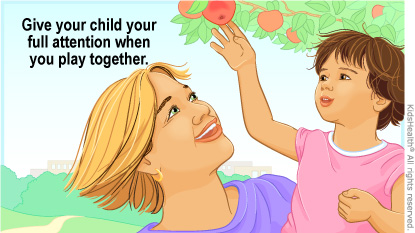Toddlers learn a lot from playing. They learn how to interact with others and what behaviors are OK. Playing with your toddler is a chance for you to give your toddler your full attention, encourage good behaviors, and bring you closer. Here are some tips.

Choose a time to play:
Find 10–15 minutes when you can give your toddler your full attention. If you have other children, plan playtime for when they're napping or help them find something to keep them busy, like playing quietly or reading a book.
Give the playtime a name:
- Call it something like "special playtime" or "you and me time."
- Let your toddler know that this time is just for the two of you to play together.
Let your toddler choose the activity:
- It doesn't matter what your toddler chooses — the important part is that you interact.
- If your toddler has trouble choosing, suggest activities without rules, like building blocks, cars, trains, dollhouses, coloring, crafts, or puzzles. Use your imaginations or be silly.
- Let your child take the lead. Don't try to control the play.
- If your toddler wants to watch a movie or do other screentime with you, tell them that is for another time, not when you are playing together.
- Join in the play and comment on what you're doing. For example, "We're carefully stacking the blocks." This shows your toddler that you're interested.
During playtime:
- Build on what your toddler starts. For example, if your child is acting out a story, help them continue. If they build a house with blocks, you can suggest that you add furniture.
- Praise your toddler for behaviors you want to encourage. For example, when your child hands you something, smile and say, "Thanks!" When your toddler takes turns, say, "You're taking turns so nicely."
- Make playtime fun. You can say something like "It's fun to play together" to let your toddler know you're enjoying yourself too.
Help your toddler behave well when playing together:
- Try not to plan playtime for when your toddler might be tired or hungry.
- If your toddler gets upset, help them move on to a different activity.
- Make the area you play in with your toddler safe, so you don't have to say "no" often.
- Give simple directions. Say no if your toddler does something they shouldn't do. Tell your child what to do rather than what not to do. Try "Use a quiet voice" instead of "Stop yelling."
Ending playtime:
- When playtime is up, tell your toddler that you've enjoyed playing together and that you look forward to the next time.
- Let your toddler know when the next playtime will be.

What are the benefits of playtime? Playtime is a time to relax, have fun together, and encourage your child's good behavior. Sometimes, kids who aren't getting the attention they want from their parents act out or misbehave because they're sure to be noticed that way. Playing with your toddler helps them learn to get your attention by behaving well.
What if my toddler starts to act out during playtime? If it's something small, ignore the behavior and try to change the focus to playing. If the behavior continues or gets worse:
- Warn your toddler once. For example, if your child starts throwing toys, calmly say, "If you keep throwing your toys, we'll stop playing."
- If your toddler doesn't stop, end the playtime early. Do this calmly, without getting upset or angry. Say something like "We'll stop playing now and we'll play again tomorrow."



